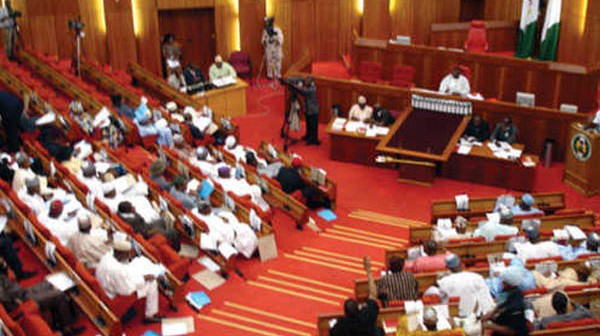The Senate yesterday passed the N4.493 trillion four months after the Coordinating Minister for the Economy and Finance Minister, Dr. Ngozi Okonjo-Iweala, presented the 2015 budget to the National Assembly.
The national budget, which was passed the by the House of Representatives last week, was N51 billion higher than the N4.425 trillion submitted to the Senate and the House of Representatives.
Senate’s approval of the budget yesterday was without any provision for fuel subsidy while the version submitted by Okonjo-Iweala showed N21 billion funding for the Subsidy Reinvestment and Empowerment Programme (SURE-P). With the Federal Government’s silence on fuel subsidy, it is assumed that Nigerians may brace up for higher fuel prices this year.
In the 2015 budget, Senate slightly reduced the N2.607, 601, 000, 300 proposed by the executive to N2.607, 132,491,708 as recurrent expenditure and simultaneously scaled down the capital expenditure from N642,848,999,699 estimated in the proposal to N556,995,465,449.
Chairman, Joint Senate Committee on Appropriation and Finance, Ahmed Mohammed Maccido, said details of the figure approved by Senate were not different from the version passed by the House.
He confirmed to newsmen after the passage of the budget that the executive did not make provision for subsidy in the 2015 budget and that the National Assembly left it the way it was presented.
“There was no provision in the budget for subsidy, but I believe there should be provision for it especially since there was already a disagreement between the oil marketers and the Federal Government over subsidy payment,” he noted.
He said the budget will be driven by $53 oil benchmark, an exchange rate of N190 to one dollar; 2.2782 million barrels per barrel crude oil production daily; and deficit Gross Domestic Product (GDP) of 1.12 per cent.
Reacting to the development, Chairman of the Committee on Public Accounts Ahmad Lawan, said the incoming government would definitely review the 2015 fiscal budget because of the various flaws in it.
“I believe that the incoming administration will very swiftly bring a request for a supplementary budget which will try to create a balance between the capital allocation that will be very much required and recurrent expenditure,” he noted.
Lawan said Nigeria would have the funds to finance the budget because oil prices will continue to improve, corruption will be tackled while leakages in the system would be blocked.



Leave a Reply